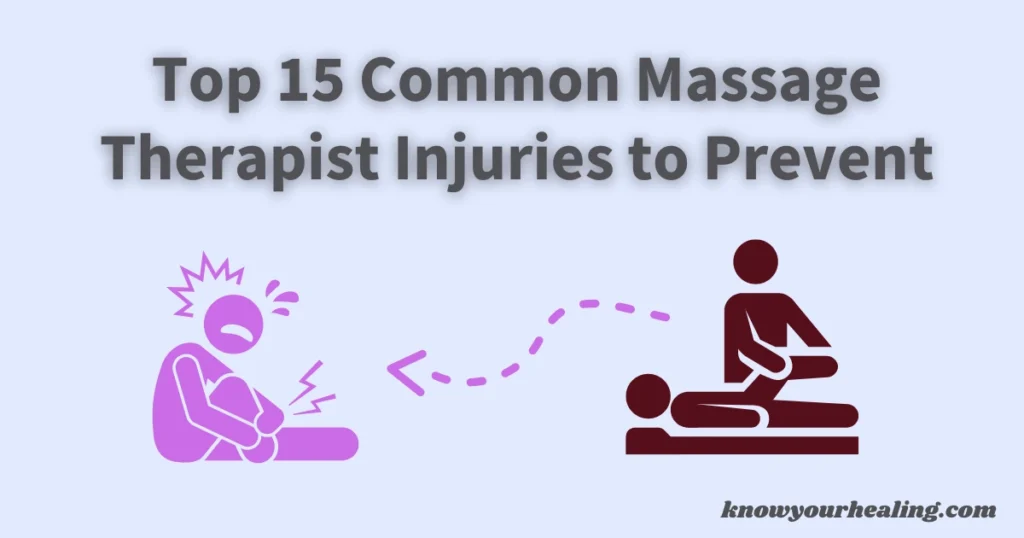Massage therapist facts delve into a world where age-old techniques meet modern well-being. Many people have questions about how effective and beneficial massage therapy truly is.
By exploring these intriguing facts, readers understand how massage therapy can enhance physical and mental health.
There is always something new to learn about massage therapy, from its historical significance to its contemporary applications.
This article offers valuable information that can illuminate the different aspects and benefits of being a massage therapist today.
Massage boosts immune function
Massage therapist facts indicate that massage therapy positively impacts the immune system by increasing lymphocyte levels, which help the body combat harmful substances.
Regular massages also support the immune system by reducing stress hormones like cortisol.
Different types of massage, such as Swedish massage and sports massage, are known for their wellness benefits.
They enhance blood circulation and promote restful sleep, contributing to the body’s natural systems function.
Through stress reduction and improved blood flow, massage provides significant health benefits.
Increases Circulation
Massage improves circulation through pressure and movement. When therapists apply pressure, they help blood flow more freely throughout the body.
This process benefits overall health by ensuring organs and muscles receive adequate oxygen and nutrients.
Regular massages can reduce muscle tension and promote the flow of lymph.
This removal of waste products from tissues enhances immune function.
Additionally, different types of massage, such as Swedish or deep tissue massage, contribute to lower blood pressure and heart rate, further supporting cardiovascular health.
Reduces muscle tension
Massage therapy effectively reduces muscle tension. Techniques like deep tissue massage target the deeper layers of muscles and soft tissues.
This eases tension and releases built-up stress.
Sports massage is another method widely used by professional athletes for muscle relief. It promotes better blood circulation, helping muscles recover faster after intense activities.
Regular massage sessions can provide pain relief.
They aid in relaxation by reducing tightness and improving the flow of lymph in the body.
Improves Sleep Quality
Massage therapist facts show that massage therapy can significantly enhance sleep quality by promoting relaxation and reducing stress, allowing individuals to achieve more restful sleep.
This is beneficial for those experiencing insomnia or other sleep disorders.
Therapeutic massage positively affects mental health and lowers stress hormones, leading to deeper sleep.
Techniques like Swedish or deep tissue massage can relax muscles and reduce muscle tension.
Regular massages improve blood circulation, enhancing oxygen delivery and nutrient flow. This contributes to a more regulated sleep pattern.
Helps Manage Anxiety
Massage therapy helps manage anxiety by promoting relaxation and reducing stress levels.
A good massage therapist uses various techniques to calm the mind and body, leading to a more peaceful state.
The benefits of massage therapy extend to improving mental health by lowering cortisol levels and increasing the body’s natural production of endorphins.
Therapeutic massage can also lower blood pressure and heart rate, improving overall health.
Regular massages support better immune function and bring about significant stress reduction. These effects can help individuals struggling with anxiety feel more in control and at ease.
Enhances Flexibility
Massage therapist facts reveal that massage therapy can significantly enhance flexibility by targeting soft tissues and helping them become more pliable.
Regular massages aid in loosening tight muscles and improving the range of motion.
Sports massage is particularly effective in increasing flexibility. It prepares muscles for movement by boosting blood circulation and reducing tension.
Athletes often incorporate massages into their routines to maintain optimal flexibility and performance.
Different types of massage, such as deep tissue massage, address specific areas to release tension and improve mobility.
By enhancing flexibility, massage therapy contributes to overall health and well-being.
Lowers blood pressure
Massage therapy helps lower blood pressure. Research shows that different types of massage, such as Swedish or deep tissue, can effectively reduce high blood pressure and stress hormones.
Therapeutic massage can improve blood circulation and heart rate, supporting overall health.
Regular massage therapy is a beneficial addition to a wellness routine. This approach reduces stress and releases endorphins, enhancing mental and physical well-being.
Alleviates headaches
Massage therapy often alleviates headache pain by targeting muscle tension and increasing blood flow.
Techniques like deep tissue massage focus on relieving tight muscles, which can contribute to tension headaches. This treatment can also encourage the flow of blood to the affected areas.
Regular massages not only help with headache relief but also reduce stress, leading to an overall improvement in health.
Professional massage therapists use massage techniques on the neck and shoulders to ease tension and promote relaxation.
Promotes Relaxation
Massage therapy is well-known for promoting relaxation. It helps reduce stress hormones in the body, enhancing feelings of calm.
Techniques such as Swedish massage are particularly effective for relaxation.
Regular massages not only relax the body but also benefit mental health.
They can lead to the release of endorphins, the body’s natural painkillers, which improve mood and create a sense of well-being.
Stimulates Lymphatic System
Lymphatic drainage massage can promote the movement of lymph fluids throughout the body. This helps remove waste products, thereby aiding detoxification.
A good massage therapist uses light pressure and rhythmic movements to encourage lymph flow.
Regular massages improve immune function by keeping the lymphatic system efficient.
This therapeutic massage can also help with stress reduction, contributing to overall health.
Professional massage therapists often include lymphatic techniques in treatment plans, especially for clients seeking a boost in immune system function.
Releases Endorphins
Endorphins are vital in massage therapy’s benefits for the human body. They are often referred to as the body’s natural painkillers because they help reduce pain and promote well-being.
Massage techniques, such as deep tissue massage and Swedish massage, can stimulate the release of endorphins. This release leads to pain relief and contributes to mental health improvement.
Hour-long massages can enhance the flow of lymph, supporting the immune system.
Massages positively impact physical and mental health by reducing stress hormones and promoting relaxation.
Improves posture
Massage therapy can significantly improve posture by relaxing and loosening tight muscles caused by poor alignment.
Deep tissue massage targets the deeper layers of muscle and connective tissue.
This technique can release tension and knots, enhancing flexibility and easing muscle balance.
Better posture improves physical health and contributes to mental health by reducing stress and promoting well-being.
Boosts mental clarity
Massage therapy can enhance mental clarity by improving blood circulation. Better circulation means more oxygen reaches the brain, helping one think more clearly.
Regular hour-long massages can also lower stress hormones, improving focus and concentration.
Different types of massage, like Swedish and deep tissue, provide mental clarity by relaxing the body and reducing tension.
Professional massage therapists use specific massage techniques to target areas of the body that hold stress, helping to release mental blockages.
This therapeutic approach helps improve mental health, contributing to clearer thinking and a more focused mind.
Supports injury recovery
Massage therapy is a crucial tool for supporting injury recovery. It aids in pain relief and helps improve blood circulation, which is vital for healing.
Professional massage therapists tailor treatment plans to meet individual needs.
Different types of massage, like sports and deep tissue, focus on specific areas, helping with pain management and reducing muscle tension.
Regular massages also promote the release of endorphins, the body’s natural painkillers, aiding in a quicker recovery.
Reduces Scar Tissue
The benefits of massage therapy in reducing scar tissue are well-documented.
Massage techniques improve blood circulation in affected areas, delivering essential nutrients and oxygen that support healing.
Regular massages can break down adhesions, helping realign collagen fibers for better tissue flexibility.
Massage therapies also enhance lymph flow, promoting the removal of waste products.
This process aids in reducing scar tissue formation and facilitating faster recovery.
Professional massage therapists utilize various approaches, such as deep tissue massage, to target scar tissue effectively.
Improves Joint Mobility
Massage therapy plays a crucial role in enhancing joint mobility.
By using various massage techniques, therapists can relieve muscle tension around joints.
This helps to increase the range of motion, allowing for smoother and more flexible movements.
Regular massages are part of effective treatment plans for people dealing with joint issues.
They can improve blood flow and reduce stiffness.
Complementary treatments like sports massage and therapeutic stretching improve joint function and mobility.
Enhances Athletic Performance
Sports massage is vital for boosting athletic performance. It improves blood circulation, helping muscles receive more oxygen and nutrients.
This supports faster recovery and reduces soreness.
Massage therapy techniques target soft tissue to ease tension and increase the range of motion. This is crucial for athletes to maintain flexibility and prevent injuries.
Regular massage therapy can also contribute to lower heart rate and better overall health.
These sessions benefit athletes by reducing stress and improving immune function, allowing them to perform at their peak.
Relieves Stress
Massage therapy offers numerous health benefits, including stress reduction. It can significantly lower stress hormones, leading to a calming effect on the body and mind.
A therapeutic massage can enhance mental health by increasing the release of endorphins, the body’s natural painkillers.
Massages also benefit the immune system. They help improve blood circulation, facilitate the flow of lymph, and aid in waste removal.
Improves Skin Tone
Good massage therapists use techniques that improve skin tone by boosting blood circulation. Enhanced circulation ensures nutrients and oxygen reach the skin, promoting a healthy glow.
Massage therapies can also promote the flow of lymph, which helps remove waste products from the skin. This can make the skin appear more vibrant and youthful.
Regular massages can lead to noticeable changes in skin texture. They help restore elasticity by relaxing muscle tension and stimulating collagen production.
Massage therapy benefits include improved immune function, which supports skin health. These combined benefits help maintain a balanced complexion.
Increases energy levels
Massage therapies can boost energy levels by improving blood flow and reducing muscle tension. When muscles relax, the heart rate often lowers, allowing for a more restful state that can lead to increased energy.
Different types of massage, like deep tissue massage, help release endorphins, which act as the body’s natural painkillers. This can enhance energy and improve mood.
Regular massage therapy also reduces stress, promoting a sense of well-being that contributes to higher energy levels.
Aids Digestive Health
Massage can positively impact digestive health by aiding lymph flow and stimulating the parasympathetic nervous system. This helps improve peristalsis, the movement of muscles in the digestive tract.
Different types of massage, like abdominal massage, can benefit the digestive system. This technique can be complemented by deep tissue massage to promote relaxation and improve digestion.
Regular massages can support the body’s natural systems, enhancing digestive health by reducing stress levels and improving blood circulation.
Reduces symptoms of depression
Massage therapy can help reduce symptoms of depression through its relaxing effects on the mind and body. It may aid in lowering stress hormones and promoting emotional balance.
Regular massages improve mental health by reducing anxiety and depression. They stimulate the release of endorphins, the body’s natural painkillers, which can boost mood and foster a sense of well-being.
These health benefits are why many people incorporate massages into their wellness routines to maintain emotional and physical harmony.
Helps Fibromyalgia Patients
Massage therapy offers significant benefits for those with fibromyalgia. This condition causes chronic pain and fatigue, affecting daily life. Therapeutic massage can help manage these symptoms by relieving muscle tension and pain.
Regular massages are essential in improving blood circulation and reducing stress hormones, contributing to overall health.
By targeting soft tissue, massage can enhance the body’s natural painkillers and provide much-needed pain relief. Engaging with a good massage therapist supports mental health, helping patients find comfort and ease.
Assists with Chronic Pain
Massage therapy provides effective treatment for individuals suffering from chronic pain. Regular massages can help manage pain by promoting muscle relaxation and reducing tension. These benefits of massage therapy contribute to improved pain relief and overall health.
Therapeutic massage techniques can release endorphins, the body’s natural painkillers, further assisting pain management.
Additionally, massage can enhance blood flow, improving the delivery of nutrients and oxygen to muscles and tissues. This helps reduce pain and speed up recovery for many individuals.
Promotes Better Breathing
Massage therapists’ facts demonstrate that massage can improve lymph flow and aid breathing. The physical manipulation of soft tissue encourages muscle relaxation, allowing the lungs to expand fully.
Breathing becomes more manageable during a massage, which helps reduce tension. Professional massage therapists use techniques to release tight muscles around the chest and back.
These techniques can also enhance massage therapy’s benefits by promoting better oxygen flow and lowering blood pressure, contributing to overall health. Regular massage sessions support the body’s natural systems, promoting immune function.
Helps with arthritis pain
Massage therapy relieves arthritis pain by reducing muscle tension and enhancing joint movement. By focusing on soft tissue, massage techniques stimulate the flow of lymph and increase blood circulation, which can help ease stiffness and discomfort.
Professional massage therapists often use different types of massage, like Swedish or deep tissue massage, to target specific areas affected by arthritis. These approaches contribute to pain relief and improve overall health by promoting relaxation and reducing stress hormones.
Regular massages can also support the body’s natural painkillers, aiding in pain management for those with arthritis.
Aids in Detoxification
Massage therapy can support the body’s natural detoxification processes. It encourages blood circulation, which helps remove waste products and toxins from the body. This increased circulation aids in flushing out impurities through the lymphatic system.
Many professional massage therapists believe that regular massages stimulate the flow of lymph. This can improve immune function and support overall health.
Massage therapy can play a role in pain management and stress reduction by enhancing these bodily functions, making it a valuable part of a wellness routine.
Facilitates Emotional Healing
Massage therapy plays a crucial role in facilitating emotional healing. A good massage therapist helps clients release emotional tension through therapeutic touch. This release can lead to a better mental health state and overall well-being.
During a massage session, the gentle pressure on soft tissue encourages the release of stress hormones. This reduction supports a calm and relaxed state.
When the body’s natural painkillers, endorphins, are released, individuals may also experience emotional relief and physical relaxation.
Improves concentration
Massage therapy significantly enhances concentration. It is an effective treatment that reduces stress hormones and helps relax the mind. This relaxation supports better focus on tasks.
Professional massage therapists use techniques that stimulate touch receptors. These techniques can lower heart rate and encourage the release of endorphins, further boosting mental clarity.
Regular massages have wellness benefits beyond concentration, like improved blood circulation and reduced muscle tension. These effects contribute to a more precise and more focused mind.
Supports well-being
Massage therapies offer various health benefits by promoting a sense of well-being. Different types of massage, like therapeutic massage, can aid in stress reduction and relaxation. These therapies can help release stress hormones, which contributes to better mental health.
Regular massage therapy sessions support the body’s natural systems, including improved blood circulation. They stimulate lymph flow, helping remove waste products from the body. Engaging in regular massages can enhance overall health and wellness.
Balances hormones
Massage therapy can help regulate hormonal balance, benefiting the body’s natural systems function. Stress often causes the release of cortisol, a hormone that can negatively impact overall health.
Massage techniques like Swedish or deep tissue massage can help reduce cortisol levels. This stress reduction can lead to improved mood and mental health.
Additionally, massage may promote the release of endorphins, the body’s natural painkillers, contributing to pain relief and relaxation.
Regular massage therapy can enhance immune function by improving blood circulation and supporting lymph flow. These benefits can create a sense of well-being.
Combats Insomnia
Massage therapy can significantly help improve insomnia by promoting relaxation and reducing stress. Stress is a common cause of sleep disturbances, and massage techniques effectively minimize stress hormones and increase relaxation.
Regular massages can improve lymph flow and blood circulation, improving sleep quality.
A therapeutic session might include Swedish or deep tissue massage to target muscle tension and promote restful sleep. These types of massage harness the power of touch receptors to relax the body, potentially leading to improved sleep patterns.
Improves Body Awareness
Regular massages help individuals tune into their bodies more effectively. A good massage therapist provides feedback on muscle tension and areas that need attention. This can increase awareness of the body’s natural systems and functions.
Professional massage therapists use techniques that enhance body awareness. Clients become more aware of how stress and tension manifest physically as they manipulate soft tissue.
This increased awareness can lead to better pain management and stress reduction. By understanding their body’s signals, individuals can make informed choices about their treatment plans and overall health.
Educational Pathways for Massage Therapists
Aspiring individuals must complete specific educational and training requirements to become a massage therapist. This journey includes obtaining certification, fulfilling licensing mandates, and participating in ongoing education to maintain and enhance skills.
Certification and Licensing Requirements
Massage therapists generally need to complete an accredited training program. These programs often include courses in anatomy and physiology and hands-on practice of massage techniques. Depending on state requirements, these programs typically last 500 to 1,000 hours.
After completing their education, graduates must pass a competency exam, such as the Massage and Bodywork Licensing Examination (MBLEx). Licensing requirements vary by state, so it’s important to check local regulations. Many states mandate background checks to ensure the safety of clients.
Key Points:
- Accredited training is essential for certification.
- Licensing generally requires passing the MBLEx.
- The number of training hours can differ between states.
Continuing Education Opportunities
Continuing education is crucial for massage therapists to stay updated on new techniques and industry standards.
Most states require therapists to complete several continuing education hours to renew their licenses.
These courses can cover advanced massage methods, business management, and professional ethics.
Attending workshops, seminars, and online classes are standard methods for gaining these additional hours.
Benefits:
- Helps maintain licensure and professional standards.
- Provides knowledge of the latest therapies and trends.
- Encourages growth and skill enhancement in specialized areas.
Conclusion
Massage therapist facts highlight these professionals’ diverse and meaningful role in promoting health and wellness.
They use various techniques to address different health needs. Each style serves a specific purpose, from relaxing Swedish massages to targeted deep-tissue therapy.
Therapists undergo extensive training to ensure they can provide effective and safe treatments. This includes learning anatomy, physiology, and different massage techniques.
It’s a career that requires a deep dedication to understanding the human body and how to alleviate stress and pain.
The work of massage therapists is more than just physical therapy. It often includes emotional and psychological benefits. Clients usually find relief from stress and anxiety, highlighting the holistic nature of massage therapy.
Interesting fact: Massage is an ancient Egyptian art practice and is considered one of the oldest forms of medical care. This rich history supports its value and relevance today.
Massage therapist facts reveal that whether seeking relief from chronic pain or simply looking to unwind, massage therapy provides simple and profound solutions.




